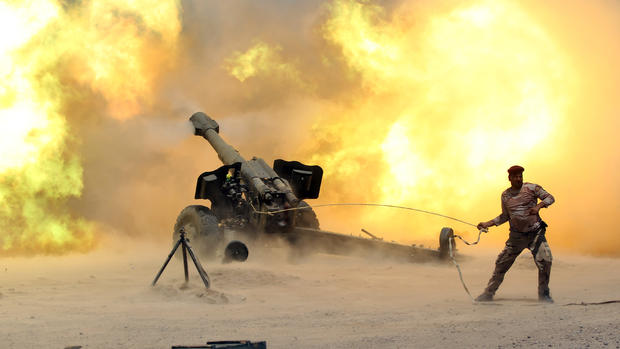Ex-Pentagon chief: ISIS fight strategy "needs to be changed"
Following the Islamic State of Iraq and Syria's (ISIS) takeover of the critical Iraqi city of Ramadi, Former Secretary of Defense Robert Gates said "we need to change the rules of engagement for our troops."
"I think we don't need a significant increase in troops in my view, but how they're used needs to be changed," Gates said Monday on "CBS This Morning."
He said U.S. troops need to be able to operate behind the lines in Iraq and support the Iraqi security forces.
"I think the idea that this battle fundamentally is going to have to be carried out by the Arabs, by the Iraqis themselves, whether they're Sunnis, or Shia or Kurds is fundamental, I agree with that. But I think there are things we can do that would make our help more effective," said Gates, who served as defense secretary under both President Obama and President George W. Bush.
He detailed some of those changes.
"I think that we need to be able to use them as forward air controllers or spotters for our aircraft; we need to have trainers embedded probably down to the battalion level in the Iraqi security forces, but I would say also with the Anbar tribes and with the Kurds; and we need to provide more opportunities to our Special Forces."
About 500 people, civilians as well as Iraqi soldiers, are estimated to have been killed as the Anbar provincial capital fell to ISIS Sunday, despite the support of U.S.-led airstrikes targeting the extremists.
Success has been met on the ground though. Saturday night, according to Pentagon officials, a U.S. Delta Force carried out a raid that killed about a dozen militants, including a key ISIS leader, Abu Sayyaf, the man described as the head of the terror group's lucrative oil operations.
According to Gates, that does not diminish changes he says need to be made on the ground.
"Even though we can have some tactical success, like killing this ISIS leader, that doesn't change the overall situation on the ground and fundamentally we're going to have to figure out a better way or a faster or bigger way to help the Iraqi Security Forces," Gates said.
Over the past month, 165 U.S.-led airstrikes were conducted on Ramadi to assist Iraqi troops.
Gates said that number shows airstrikes can help, but don't fundamentally change the situation on the ground.
"They are an important aspect of a military campaign but you can't do it all just by air power," he said.
Gates also commented President Obama's recent meeting with Gulf nation leaders Camp David.
In a rare summit Friday at the presidential retreat in Maryland, Mr. Obama met with Gulf ally representatives to discuss the Iran agreement ahead of the June 30 deadline. He said they agreed that a comprehensive, verifiable deal that blocks Iran's pathway to a nuclear weapon would serve everyone's interests.
"CBS This Morning" co-host Norah O'Donnell said while Mr. Obama's guests felt reassured on a number of fronts, they felt they've "never spent five, six hours alone with the president."
Gates said the meeting is "pretty late in coming."
"I think it's kind of a sad commentary that afterword they thought to themselves in the seventh year of a presidency 'Gee, we should have done this a long time ago,'" Gates said.
The tentative agreement world leaders drafted in April to curb Iran's nuclear program in exchange for sanctions relief cleared the way for negotiators to hammer out technical details for a final deal.
Gates said the current deal still has some "serious shortcomings."
"My hope is those can be addressed this month and next month in negotiations and it has to do with the pacing of lifting the sanctions, it has to do with whether you can re-impose sanctions, verifications, so there are some big issues," he said.
He also addressed comments he made Sunday on "Face the Nation." Gates said he wasn't very impressed with the foreign policy strategies of candidates on either side.
"On the Republican side they've had jobs that really don't involve foreign policy and so as I told Bob Schieffer, I think that over time their positions, presumably, will be fleshed out and become better," Gates said.
While he's worked with Sec. Hilary Clinton in the past, he's disappointed she hasn't spoken out in favor of Mr. Obama's trade agreements.
"I think that the trade authority that the president is seeking is very important to us. Not just economically, but politically, and in terms of our security," he said.
